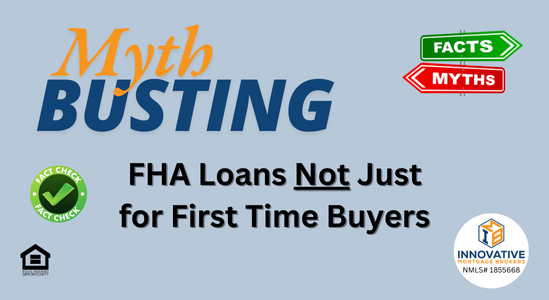Turning Rent into Equity Rent-to-own can work, but only when the paperwork is airtight. Lenders…
Myth-Busting FHA Loans: They’re Not Just for First-Time Buyers
Why FHA loans are a solid choice for both new and repeat homebuyers.
When people think about FHA loans, many believe they’re exclusively designed for first-time homebuyers. However, that’s a common misconception. FHA loans are actually available to a wide range of borrowers, including those who’ve previously owned homes. So, while FHA loans are popular among first-time buyers due to their flexible credit and down payment requirements, anyone looking for a mortgage with similar benefits can potentially qualify.
FHA Loans: Who Are They For?
The Federal Housing Administration (FHA) created these loans to make homeownership more accessible, especially for those with limited savings for a down payment or less-than-perfect credit. However, FHA loans are not restricted to first-time buyers. They’re available to anyone who meets the eligibility requirements, regardless of whether they’ve purchased a home before.
FHA guidelines are designed to help people who might face challenges qualifying for conventional loans, mainly due to credit history and income. This makes FHA loans a good choice for a wide variety of people, including:
- First-time homebuyers: FHA loans’ lenient requirements make them particularly attractive for those buying their first home.
- Repeat buyers: Individuals who’ve owned a home in the past but are looking for a new home can also benefit.
Why FHA Loans Are Commonly Seen as First-Time Buyer Loans
FHA loans have become synonymous with first-time homebuyers because the program’s structure makes it easier for new buyers to qualify. First-time homebuyers often lack the income and high credit scores that can help in securing conventional loans. With FHA loans, borrowers with credit scores as low as 580 can qualify with a 3.5% down payment, while some lenders might even work with borrowers down to a 500 score with a 10% down payment.
While FHA loans are indeed favorable for first-time buyers, the program’s flexibility is beneficial to other groups too. For example, people who have gone through challenging financial events like a foreclosure or bankruptcy may be able to qualify sooner with FHA guidelines than conventional loan standards allow.
Key Benefits of FHA Loans for All Borrowers
- More Lenient Credit Requirements: FHA loans are known for being more forgiving with credit scores. Their min score requirement is 580+ for 3.5% down, and they can go as low as 500 with 10% down. This is ideal for people rebuilding their credit or those who may not meet the stricter requirements of conventional loans.
- Debt-to-Income Flexibility: FHA loans allow for a higher debt-to-income ratio (DTI) than conventional loans. This can be particularly helpful for borrowers who have significant student loans or other debts.
Differences Between FHA Loans and First-Time Homebuyer Programs
While FHA loans are open to all qualified buyers, some local or state programs are specifically geared toward first-time buyers, offering down payment assistance or lower interest rates. FHA loans, on the other hand, do not provide direct financial assistance but instead offer easier qualification terms. As such, FHA loans can be combined with various first-time homebuyer assistance programs, providing even more support to those looking to enter the housing market.
For example, someone purchasing their second home after relocating for work might still qualify for an FHA loan if they don’t currently own another FHA-financed property. Similarly, those re-entering the housing market after an event like divorce or foreclosure can use FHA financing to purchase again, without being classified as first-time buyers.
Important Considerations for FHA Borrowers
While FHA loans offer a number of benefits, there are some unique aspects to consider:
- Mortgage Insurance Premiums (MIP): FHA loans require both an upfront and annual mortgage insurance premium. This is similar to PMI on conventional loans but continues for the life of the loan if the down payment is less than 10%.
- Property Requirements: FHA loans have specific property standards for safety, security, and structural integrity. This ensures the property is a sound investment, but it can sometimes limit options, especially for homes needing repairs.
- Loan Limits: FHA loans have borrowing limits that vary by location, which could affect buyers in high-cost areas. These limits are typically lower than those available with conventional jumbo loans.
FHA Loan Limitation: One Loan at a Time
It’s important to note that FHA loans are generally limited to one active loan per borrower at a time, although there are certain exceptions. This means if you currently have an FHA loan on a property, you will need to either sell that property or refinance it into a conventional loan before taking out another FHA loan on a new property.
FHA Loans: A Versatile Option for All Types of Buyers
FHA loans have a broad appeal and aren’t restricted to first-time buyers. For anyone who meets the FHA’s guidelines, these loans can be a viable financing option, offering more accessible terms and potentially lower initial costs compared to conventional mortgages. Whether you’re a first-time buyer, a previous homeowner, or someone with a complex credit history, FHA loans offer a pathway to homeownership that many conventional options do not.
Final Thoughts
At Innovative Mortgage Brokers, we know that choosing the right loan can feel overwhelming, especially with so many myths and assumptions about FHA loans and first-time homebuyer programs. Our goal is to clarify these options and guide you through the mortgage process, helping you find the best fit for your financial situation, whether it’s FHA or another loan product. Reach out to us today, and let’s explore how FHA or other options can work for you, regardless of whether it’s your first or fifth home.





